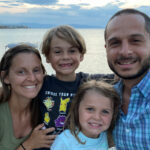Solo episode where I talk about the choices we make and how they impact our qualify of life.
Hard choices, easy life. Easy choices, hard life.
There’s a lot of value to this mental model. It’s been huge for my family and I in terms of how we make decisions and why. I hope you enjoy the show!
Transcript
What is up folks? Ali here back with another shorter solo episode. Today we're going to talk about choices and how they relate to our quality of life. This topic is very top of mind for me, since I just recovered from an experience where I was acutely reminded of the consequence of a certain choice, we'll dig into that in a bit, but for now let's get into it.
So the mental model here is hard choices, easy life, easy choices, hard life. What does that even mean? Well, our lives are essentially a by-product of all the choices we make from smaller, daily micro decisions to larger, more impactful macro decisions. Some choices are easier, which lends to a harder life and other choices are harder, which lends towards an easier life.
That's the model. Let me give you some examples. We'll start with some macro examples, your diet. This is a big part of your life. Easy choice, eat fast food with processed ingredients. Hard choice, eat healthy food with real ingredients. The consequence here is the quality of your personal health.
Another example, work. This is another huge part of our life, hence a macro decision, what we do for work and how we work. Easy choice, taking a job you don't like, becoming a workaholic or having no work ethic at all. Hard choice, going after something you love, maintaining work-life balance, giving everything you have to your career.
These are examples of harder choices. The consequence of these decisions the quality of fulfillment and also stress in your life. Some of these choices can have dual consequences, both from a good and a bad perspective.
Another example is relationships. Easy choice, do your own thing, only focused on yourself, become very self-centered. Harder choice, give and invest time into others. The consequence here is the quality of connection and support from others.
If we go a bit more granular into some micro examples, let's talk about daily communication. Easy choice, impulsive reactions to emails or text messages, things that can set you off and trigger it. It's easy to just react to those things. Hard choice, take time to sit and process things, to give them space. The consequence of this type of decision is the quality of stress in your life.
Another one is your ability to be on time for things. The easy choice here, it's easy to be late and not consider other people's time. Just do what you want, live on your own terms. The harder choice is committing to being on time, considering other people's times and respecting that. And the consequence there is the quality of respect you receive from others.
A final micro-example is just drinking, partying, doing things recreational. The easy choice here is that it's temporary fun and relief from everyday life. The hard choice here is being present without substances. Just sitting in the moment, completely sober as your true self. And the consequences is dual. You know, quality of your health, quality of your relationships.
So those are some examples of the smaller, more granular, micro decisions that we make on a daily basis.
One of the things I want to point out that is very related to this mental model is speed. In other words, there's a direct correlation of speed to the hard and easy choices that influence our quality of life. Hard choices usually require more time, not always, but usually. Whereas easy choices are fast impulsive. And hence tend to lean towards harder consequences or, or more difficult outcomes.
So it's important to be cautious of these easy choices, especially if something seems too easy. Because underneath the hood, there's a hidden cost. That could be something you don't see quite yet, which is why you important to catch yourself when you're in a choice that seems too fast, too easy.
Some examples of this, microwaves. Most of us use microwaves to just quickly heat up food. There's a hidden cost. We're obliterating the nutrients in our food just to get that speed, to get something hot quickly, instead of taking the longer route.
Painkillers. How many people do you know that pop aspirin or ibuprofen or Tylenol when they have a small headache. That's an easy way out, right? It gets rid of the headache, but you know what it's doing underneath the hood, it's numbing your brain, it's injecting chemicals. And there are certainly long-term effects of that.
Fat-free foods. Zero sugar foods. These on the surface are so easy. They promise you something better health. There's no fat, there's no sugar, but guess what? There's definitely some chemicals and substitutes to replace that sweet taste or that fatty taste, which again, certainly have long-term effects.
A final example there's get rich quick schemes. These are all over the place. It's easy to see things and to get marketed to and 99% of these things are scams. They are devised to be quick and witty and give you a false sense of hope. And then underneath the hood, there is nothing of substance there. Just more deceit and confusion than before.
So ultimately the lesson here is that you cannot speed through hard decisions. They simply require time. Put the time in and you'll realize an easier life long-term. So I wanted to share a few examples from my life.
One area is fitness routine. Ever since high school, I have worked out relentlessly. I've managed a very high discipline for fitness, exercise, athletic sports. I've made the hard choice to always stay active and prioritize fitness in my life. And as a result, I've had very few injuries or health conditions or any of the things that, you know, humans tend to be plagued with where the remedy is staying active and getting exercise.
Balanced diet. I've made the hard choice to eat mostly vegetables and real food. And as a result, I've had virtually no disease or side effects. I'm reaching 40 now and starting to see some things, but I've virtually been invincible from that standpoint, which you know, have some humility towards, but I'm also proud of the fact that I have eaten very well for most of my life.
And commitment to learning and growth, this is another place where I've made the hard decision to really invest in education, books, podcasts, personal growth, coaching, all these things in attempt to better myself in different areas of life.
And as a result, I've been able to master certain skills that have helped me attain a lot of lifestyle freedom. That's one of the reasons I can record this podcast and have fun. And enjoy it with other guests to have amazing things to share.
Now I am certainly not perfect. So believe me, I've made some easy choices as well.
As I mentioned at the beginning of this episode, I'm just coming off an easy choice where last week, my family and I had some frozen chicken fingers for dinner. Myself, my son and my daughter. And within 24 hours Sepia was puking. And then within 48 hours, Everest was puking and within 72 hours, we were all sick with some version of food poisoning and it wrecked our house for an entire seven days.
You can imagine what that does to school, schedules, just personal health morale. Stress levels in the home. So that one simple choice to be like, ah, let's just pop in some chicken fingers tonight, yielded a week of stress and anxiety and pain. What was the hard choice there? Prepare and cook your own food.
Another area where I've made some easy choices is in business. I've made some easy choices in terms of working with clients that seem too good to be true and had the money and were ready to go, and I did not vet them properly. Just took them on and months later things start to unravel and there was a lot of stress and expense in terms of energy, financial expenses to deal with because of that easy, quick decision upfront.
I've also made this decision with team members. There's been situations where I've hired people on more of a gut reactions that of doing the research and really interviewing them properly and getting to know them and see if they're a great fit. And the consequence there was that months later they ended up leaving, which again is an expensive investment to recover for a business, especially a small business.
Now something else I want to highlight, because it's just very relevant to today is the current situation with the pandemic. A lot of people who have suffered fatalities or more severe health issues from COVID have existing underlying conditions.
And this makes perfect sense. I'm not going to go into a lot of deep detail here, but the idea is that a majority of those people, a percentage of those people, likely made a lot of easy choices and now they're paying the price. Now they're suffering from the consequence.
For us, you know, COVID was relatively smooth experience. My family was prepared. We got it. There was some mild illness for a couple of weeks, but we pushed through it because we've made the hard choices with health, fitness, and just managing that side of our lives. We make those hard choices on a daily basis. And so when COVID hit our house, we were ready and we got through it.
You know this also applies to group decisions, holistic decisions as well. This is not just about us as individuals. So if we zoom out for a minute, look at global warming. Look at what's happening to our world, to our environment, to the atmosphere.
The easy choice is to just drill for more oil, right? Build more factories, create more pollution, which is exactly what we do most of the time. The hard choice is to invest in more sustainable energy sources. To really care about the planet and the impact we're making on it. The consequence here is drastic. It's the future of our world.
So this is a place for humans to pay attention and say, where are we making the easy choices? And why aren't we making the hard choices when it's so clear on what that consequences? Right.
Recycling is another great example. The easy choice is to just create more trash, throw things away. Don't think twice about which bin it goes into. It's easy to just throw it into the trash. Teach your family to do the same. The hard choice invest in recycling. Invest in composting, invest in doing more with less in minimizing your footprint of how many things you use and consume on a daily basis.
My family practices this. We have recycling, we have compost, we have trash. Our trash is the least used of those three containers. In fact, we fill up our recycling and our compost way faster than we do our trash. And we're very mindful of it. There's times where I have to pause and catch myself still, even though it's a built-in habit. Where I look at some like a jar and I'm like, man, it's going to take a couple of minutes to really rinse this out, clean it and put it in the recycling. But I do it because I care about the sustainability of our planet.
And that's really the lesson here is that by taking the time to invest in hard decisions, we're contributing to a longer term vision for ourselves, for others, for our planet, for the world at large.
One last thing to kind of wrap this up is something I learned from Neval Ravikant is that he has a beautiful concept of long-term versus short-term games. Very similar to this in terms of long-term games, being hard decisions, short-term games, being easy decisions.
And this is a really nice mental model to help distill some of your decision-making. His premise is that long-term games are not easy to reverse. Whereas short-term games are easier to reverse. Some quick examples there.
Longterm games, where we live, who we get into serious relationships with whether that's marriage, business partnerships, et cetera. What we do for work, and then how we take care of ourselves on a daily basis.
Short-term games are things like quick trips or vacations or one-time experiences. Social gatherings so you just meet up with friends. Occasional meals out instead of cooking your own food, et cetera.
So these are easier, faster choices that relate to the short-term games. And the short-term games do not have near as much impact on our lives. That's why Neval says they're much easier to reverse. Whereas the longterm games do have a lot of impact on our lives and are much harder to reverse.
I had a very good wake up call to this back in September of last year when I scouting some real estate. Both my wife and I jumped on planes for quick weekends to North Carolina on different weekends to go check out some houses with our agents. We got really caught up in searching Zillow and finding things we liked and we made the impulsive decision to just go. To go on a weekend, even though we had some great advice and guidance from people like, Ooh, that's, that's not going to be easy. You know that could be a stressful experience.
And they were certainly right. Going there for 2, 3, 4 days and trying to find something you love and coming back with an expectation of we're going to move, we found the place like that is just not from my perspective, the way to approach that type of decision. This is a hard choice. It requires proper planning, research, and space to make a great decision that you can feel good about. That's going to lead to an easier life. It would have been the easy choice to make an offer on one of those weekends, find ourselves wrapped up in buying a new house and then being like, oh my goodness, what just happened?
So the key is becoming aware of our hard choices and giving them the time they deserve. And I also want to say it's okay to make easy choices, especially for these shorter term games. We just have to be aware of the consequences. There's always a consequence of a choice, whether it's simple or more complicated, easy or hard.
And ultimately balance is the key here. You have to find your mix of hard versus easy choices as it relates to your optimal lifestyle. Some people can get away with lots of easy choices and every now and then they have to make harder choices. Whereas other people will find themselves really suffering from these easy choices. And so it becomes pretty evident that they need to make more harder choices and minimize the amount of easy choices they make.
I think everyone has their own unique blend or combination of this. And in general, I would say minimize your easy choices, unless it's very clear that they have consequences with very low impact.
And so what I will leave you here with today is pause and take inventory of your choices. Go ahead and audit the decisions you've been making recently. Then think about which ones were hard versus easy choices and the results they've produced. Now you should have some clarity and more awareness to make better decisions. That's the whole point. I will leave you with that. I hope this was helpful, until the next time.
Ali Jafarian
Ali is a father, husband and serial entrepreneur with a deep drive to create. He writes, records, codes and builds things to inspire the artist in all of us.



